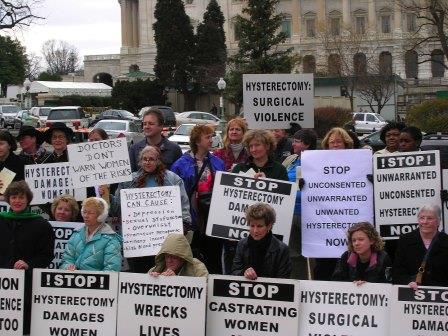Why
Are Hysterectomies Often Unnecessary?
The United States has the highest rate of hysterectomy
in world. According to the Centers for Disease Control and Prevention
(CDC), hysterectomy is the second most frequently performed
surgical procedure (after cesarean section) for women in the
United States. Approximately 600,000 hysterectomies performed
each year in the United States. It is estimated that 85% to
90% of all hysterectomies are unnecessary so it is important
for women to get a second opinion preferably from a naturopathic
or integrative medicine physician and do some research on alternative
options before they proceed with a hysterectomy. Studies show
that many hysterectomies performed in the United States are
not medically necessary, evidenced by the fact that today, most
of hysterectomies are performed electively. The National
Women's Health Network (NWHN) believes that unnecessary
hysterectomies have put women at risk needlessly, and that health
care providers should recognize the value of a woman's reproductive
organs beyond their reproductive capacity and search for hysterectomy
alternatives before resorting to life-changing operations.
Doctors often fail to tell patients the truth
about risks and adverse effects of hysterectomy and how many
hysterectomies are actually unnecessary. Many doctors choose
to not tell patients about hysterectomy alternatives because
they make much more money from performing hysterectomies. Gynecologists,
hospitals and pharmaceutical companies make more than $17 Billion
dollars a year from hysterectomies.

Any woman considering a hysterectomy is encouraged
to watch this HERS Foundation’s video of “Female
Anatomy: the Functions of the Female Organs.”
When is hysterectomy medically necessary?
Hysterectomy may be a medically necessary intervention
in the case of several life-threatening conditions:
- Invasive cancer of the uterus, cervix, vagina, fallopian
tubes, and/or ovaries
- Unmanageable infection
- Unmanageable bleeding
- Serious complications during childbirth, such as a rupture
of the uterus
For other conditions, it is important to evaluate
all options before resorting to hysterectomy. You should research
hysterectomy alternatives and talk to your doctor about watchful
waiting. If your condition is not causing problematic symptoms,
you may want to closely observe your symptoms without initiating
active treatment.
Conditions That Have Hysterectomy
Alternatives:
- Fibroids - There are many treatment options
for shrinking or removing uterine fibroids without removing
reproductive organs. These include using antiestrogen drugs,
uterine artery
embolization (UAE), laser ablation of uterine fibroids,
cryosurgery, and myomectomy. For more information on fibroids,
click here. Make sure
you research the bad adverse effects that can happen as a
result of uterine
artery embolization (UAE) before you consider this procedure.
- Cancer
- Hysterectomy is often necessary
and life preserving when invasive cancer is diagnosed, however,
hysterectomy is frequently recommended when cancer is neither
invasive nor life threatening. For pre-cancerous cells, there
are a few options that you and your health care provider should
discuss. Loop Electrosurgical Excisional Procedure (LEEP)
can be used to remove pre-cancerous cells, and cryosurgery
can be used to treat non-cancerous growths and abnormal tissue.
For early invasive cervical cancer that has not spread to
other regions, a radical trachelectomy (the removal of cervix
or the neck of the uterus) can be performed in lieu of a total
hysterectomy.
- Excessive Endometrial Lining - Endometrial
ablation can be used to remove excess endometrial lining.
Dilation and Curettage (D&C) can also be used to remove
the lining or abnormal tissue.
- Endometriosis - Operative laparoscopy
is a surgical procedure that can generally be done on an outpatient
basis to remove endometrial growths and adhesions. Pain medication,
hormone therapy and other conservative surgical procedures
can also be used to control any discomfort associated with
endometriosis.
- Uterine Prolapse - According to MedlinePlus,
an information service of the National Institutes of Health
(NIH) a vaginal pessary (an object inserted into the vagina
to hold the uterus in place) can be used as a temporary or
permanent form of treatment for a prolapsed uterus (MedlinePlus).
Vaginal pessaries are available in many shapes and sizes and
must be individually fitted. A surgical procedure called a
'suspension operation' can also be performed to lift and reattach
a descended uterus, and often a fallen bladder or rectum as
well. Health practitioners suggest that Kegel exercises can
be a powerful prevention and treatment tool for strengthening
uterine muscles and avoiding prolapse.
(Source: National
Women's Health Network - Hysterectomy)
What are most common consequences of
hysterectomy?
• surgical complications such as infection,
bladder perforation, hemorrhage during or following surgery
and/or damage to internal organs such as the urinary tract
or bowel
• heart disease
• loss of sexual desire, arousal, sensation
• weight gain
• osteoporosis
• bone, joint and muscle pain and immobility
• painful intercourse, vaginal damage
• displacement of bladder, bowel, and other pelvic organs
• urinary tract infections, frequency, incontinence
• chronic constipation and digestive disorders
• debilitating fatigue
• loss of stamina
• altered body odor
• loss of short-term memory
• blunting of emotions, personality changes, despondency,
irritability, anger, reclusiveness and suicidal thinking
Other Important Resources
to Check Out:
Facts
about Hysterectomy
Adverse
Effects Data for Hysterectomy - HERS Foundation
Hysterectomy
Lies blog
Hysterectomy
Consequences
Can
Hysterectomy Hurt Sex Lives? – 20/20
An Overview
of Hysterectomy
When
Is a Hysterectomy Necessary?
Hysterectomy
and the “C” Word
Hysterectomy
may have long-term health risks
We strongly recommend that all women considering
hysterectomy take time to research information on the web site
of HERS Foundation.
They have many excellent resources about hysterectomy alternatives
and after effects. This organization has helped many women to
avoid hysterectomies.
If you must have a hysterectomy
and you are concerned about your modesty during the surgery,
check out Concerns About
Modesty During Hysterectomy.
Other Related Articles:
How
is Female Urinary Catheterizations Done?
Concerns
About Modesty During Hysterectomy
Tips
For OB/Gyn Patients
Female Patient
Modesty
Sources:
National
Women's Health Network - Hysterectomy
HERS
Foundation
Facts
about Hysterectomy - HERS Foundation
|







